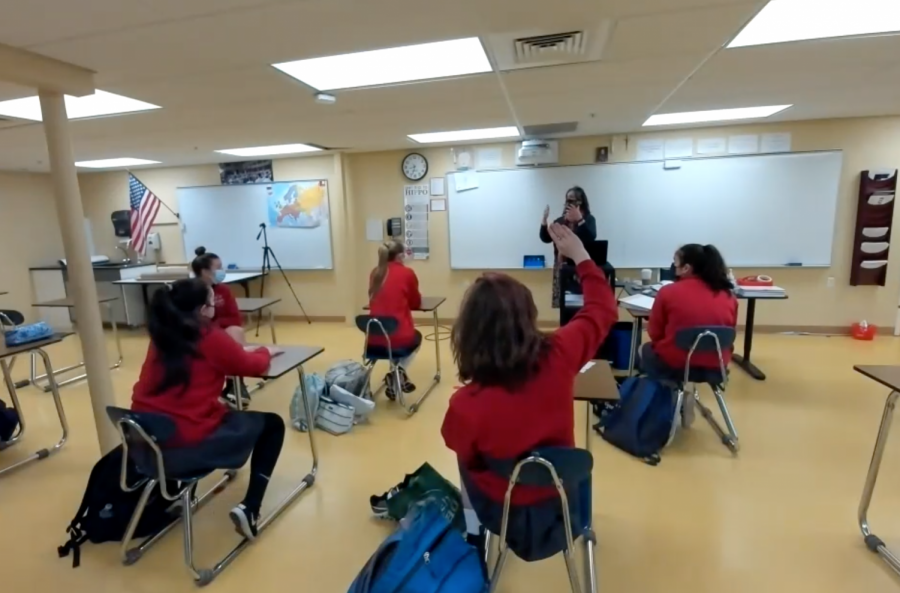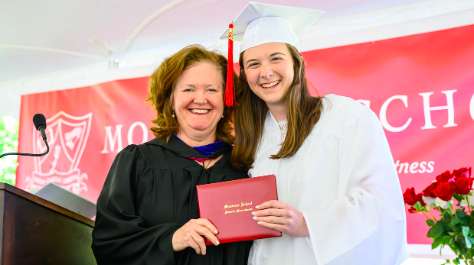AP Euro Class Review
Faith Editor Theresa Marcucci reviews one of Montrose’s most notorious classes.
If anyone has class in the middle school hallway during E Block, you may have heard the AP European History class being released for a “3 minutes, only, PLEASE” mask break. We have a difficult time remaining silent in our jubilation as we have gained the freedom of a mental break from our intense study of the history of Europe, which somehow always devolves into current events. Like the time we were talking about the growth of trade in Europe and ended up talking about the EverGiven ship which was, at the time, stuck in the Suez Canal. Or the time we had an in depth discussion on the cruel and unusual punishment of being drawn and quartered, thankfully not a current event. The topic of European History is a fascinating and nuanced one, but it can sometimes be hard to know whether it is worth it to take the AP class. Let me break it down for you.
The Workload
Necessarily, AP classes have a lot of reading that needs to be done, as there is a fair amount of information on the AP exam. For AP Euro, we cover from the Renaissance to after World War II, examining each country, their development, and their interactions with each other. Especially this year, this requires most of our reading and introduction to new things to happen at home by reading the textbook. We weren’t always able to go over everything in class, so understanding the textbook reading is really important.
We also practice AP “skills,” or types of things that are on the exam, like short answer questions (SAQs), multiple choice questions (MCQs), long essay questions (LEQs), and my personal favorite, document based questions (DBQs). On Wednesdays, we practice different critical thinking skills to practice for these different types of questions. We also practice all these throughout the year, on tests, Wednesdays, and through homework assignments — some graded and some not — in order to prepare for the exam. Most of the homework is either textbook reading or one of the types of questions. Mrs. Forsgard will assign a DBQ or LEQ to practice writing, and MCQs to get acquainted with the phrasing of multiple choice, all important for performing well on the exam.
AP Euro is definitely my heaviest class in terms of work, but it is also the class that needs the most time outside of class in order to stay on track and keep learning.
The Class Dynamic
The material which we cover in European history is interesting and important. While we tend to get sidetracked, Mrs. Forsgard is passionate about what she is teaching, and manages to bring us back to what we are learning. She also explains what she teaches very well, and gets super into the story that she is telling. I found this really helpful in learning about European history, because it puts everything into context. Mrs. Forsgard loves to share stories connected to what we are learning, which also helps me to remember important information. For example, during class today, she helped us understand the animosity between Italian Catholics and Irish Catholics by sharing a story told to her by her grandmother. Brooms were involved, children were disowned. Some information is less important. But information nonetheless!
My classmates and I have also bonded over the common difficulty which is an AP class. Studying for a test, right before the test, is a common occurrence, and some people quiz others. Some are asleep on their desks. Others stare listlessly into the distance, perhaps rethinking their decision. One person checking with another: “ So Boers were…..” “Dutch?” Someone adds: “Yeah, yeah! But they were farmers, right?” “ Oh right…. Dutch farmers in South Africa!” Communal learning? We got it down.
Overall
AP Euro is challenging, but it is also very rewarding. Elyza Tuan ‘23 said: “It shouldn’t matter if you’re good at it when you decide to take it, because you will develop the skills [for] the class. Everyone is capable of taking AP Euro.” She also added the importance of being able to take notes and unpack large amounts of information in a short amount of time. Julie Baker ‘23 said: “I think [AP Euro] might actually be one of my favorite classes. I would highly recommend it.” Lucy Bachiochi ‘23 said that AP Euro “pushes you to learn more than you thought you could have learned in a year.” She also added that it is a very fun class. AP European History teacher Mrs. Forsgard said to take the class “if you are curious about human behavior. [AP Euro] helps you to understand the questions to ask in order to understand the economy, politics, and issues of today.”
Remember, this is your decision. You do not have to take AP classes in order to get into college or be considered “smart” or “hardworking”. If you don’t like history or science or whatever class, don’t take the AP! In the end, you are in control of what classes you do or do not take.
Theresa Marcucci ‘23, Faith Editor











